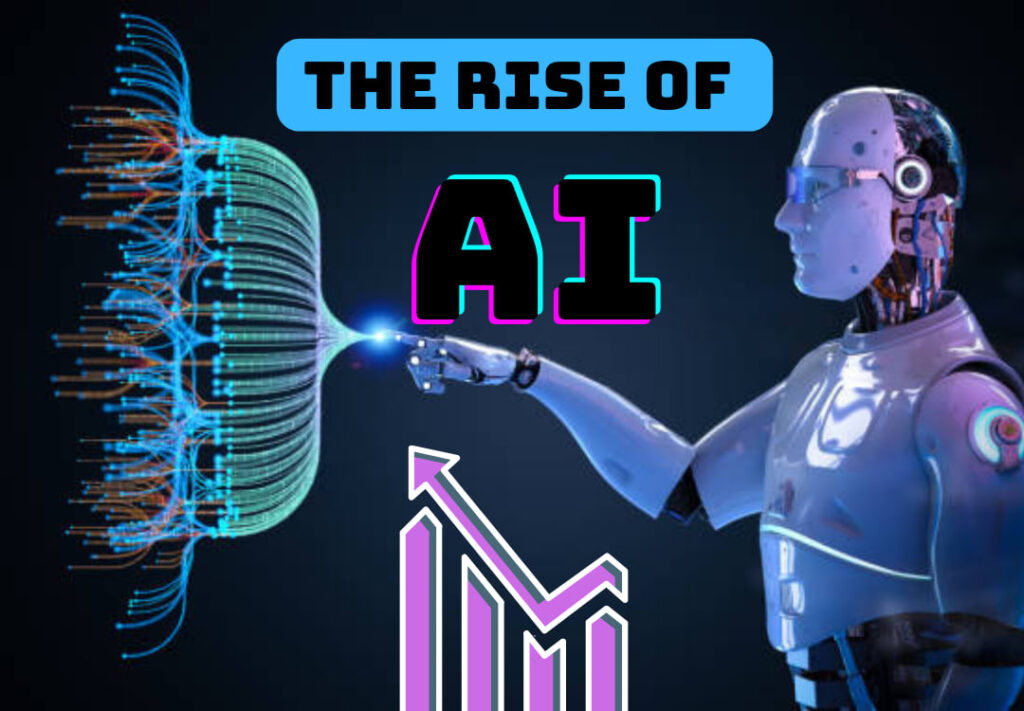What is the rise of AI?

Artificial Intelligence (AI) has become a key part of the modern world, influencing everything from how we work to how we live our everyday lives. This rise of AI is one of the most important technological developments of our time. But what exactly is AI, and how did it come to be such a big deal? Understanding AI In the simplest terms, AI refers to machines or systems that can perform tasks usually requiring human intelligence. This means they can learn from experiences, recognize patterns, make decisions, and even understand human language and images. The idea is to create systems that can think and adapt like humans without needing to be programmed for each specific task. The Early Days of AI The concept of AI has been around for decades. It all started back in the mid-20th century, particularly in 1956, when a group of scientists and researchers gathered at Dartmouth College to discuss the possibility of creating intelligent machines. They called this new field "artificial intelligence." In those early years, AI research focused on basic problem-solving and mimicking human reasoning. However, technology was not advanced enough back then, and progress was slow. Interest in AI waned during the 1970s and 1980s because computers couldn't process data quickly, and many saw AI as just a dream rather than a reality.
The rise of AI (Artificial Intelligence) is one of the most significant technological advancements of the 21st century. It has rapidly transformed the way we live, work, and interact with the world around us. In simple terms, AI refers to machines and systems that can mimic human intelligence. They can learn from experience, solve problems, make decisions, and even recognize speech and images. Let’s explore the rise of AI and its impact on our daily lives.
What is AI?
Artificial Intelligence is a field of computer science that aims to create machines capable of performing tasks that typically require human intelligence. This includes tasks like understanding natural language, recognizing patterns, making decisions, and even playing games. The goal is to develop systems that can learn and adapt without explicit programming.
How Did AI Begin?
The concept of AI dates back to the mid-20th century. In 1956, the term “artificial intelligence” was coined at a conference at Dartmouth College. Early AI research focused on basic problem-solving and symbolic methods. However, due to technological limitations, progress was slow, and interest in AI waned during the 1970s and 1980s.
Things started to change in the late 1990s and early 2000s with the advent of more powerful computers, large datasets, and improved algorithms. This led to significant advancements in machine learning and deep learning, two key subfields of AI. Machine learning enables computers to learn from data, while deep learning, inspired by the structure of the human brain, allows AI systems to process vast amounts of information.
AI in Everyday Life
Today, AI is everywhere, often in ways we don’t even notice. Here are a few examples of how AI has become an integral part of our lives:
- Smart Assistants: Devices like Amazon’s Alexa, Apple’s Siri, and Google Assistant use AI to understand and respond to voice commands, helping us with tasks such as setting reminders, answering questions, and controlling smart home devices.
- Recommendation Systems: Platforms like Netflix, YouTube, and Spotify use AI algorithms to recommend movies, videos, and music based on our preferences and past behavior, making our online experiences more personalized.
- Healthcare: AI is revolutionizing healthcare by assisting in diagnosing diseases, analyzing medical images, and even predicting patient outcomes. AI-driven applications are helping doctors provide better care to their patients.
- Self-Driving Cars: Companies like Tesla and Waymo are developing autonomous vehicles that use AI to navigate and drive without human intervention, potentially transforming the future of transportation.
- Customer Service: AI-powered chatbots and virtual assistants are increasingly used by businesses to provide 24/7 customer support, handling inquiries and solving problems with minimal human involvement.
The Impact of AI on Jobs and Society
The rise of AI has sparked debates about its impact on jobs and society. While AI can increase efficiency and productivity, it also raises concerns about job displacement, as machines can perform certain tasks more efficiently than humans. However, many experts believe AI will create new jobs, requiring skills in AI development, data analysis, and more.
Ethical Considerations
As AI becomes more advanced, ethical concerns are also coming to the forefront. Issues like privacy, bias in AI algorithms, and the potential misuse of AI technology need careful consideration and regulation to ensure that AI benefits society as a whole.
The Future of AI
The future of AI holds immense potential. As technology continues to evolve, AI is expected to play an even more significant role in fields like healthcare, finance, and education. With ongoing research and development, AI could tackle complex global challenges, from climate change to disease prevention.
Conclusion
In conclusion, the rise of AI is reshaping our world, offering new possibilities and challenges. By understanding and harnessing the power of AI, we can create a future where technology enhances our lives, driving innovation and progress. The journey of AI is just beginning, and its impact will continue to grow in the coming years, promising a future filled with exciting opportunities.